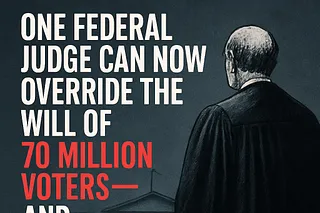By now, you've seen the pattern:
People vote. Legislators act. Judges veto.
And somehow, we're told this is democracy working as intended.
I'm trained as a lawyer in both the Army and Navy JAG Corps. I respect our legal system deeply. But what we're witnessing today isn't judicial review—it's judicial replacement of the democratic process.
And the American people deserve better than government by gavel.
The Judicial Veto Power
When judges strike down laws passed by elected representatives, they aren't just interpreting the Constitution—they're exercising a veto power more absolute than any president's:
- •Presidential vetoes can be overridden by Congress
- •Congressional deadlock can be resolved by elections
- •Judicial decisions? They can stand for generations
This creates a perverse incentive: Why win elections when you can win lawsuits? Why persuade voters when you can persuade a handful of judges?
The Constitutional Bait-and-Switch
The most concerning trend is judges who claim to be "strict constructionists" while inventing new doctrines that the Founders never imagined:
- •Agency deference principles being selectively applied
- •Standing requirements manipulated to achieve policy goals
- •Constitutional silence interpreted as prohibition—but only for policies certain judges dislike
The result? Policy decisions made by those with lifetime appointments instead of those who face voters.
A Few Unelected Deciders
The math should disturb every American:
- •Five Supreme Court justices can overrule 535 members of Congress
- •2-1 decisions from circuit courts can block laws passed by state legislatures of 40+ members
- •A single district judge can halt national policies affecting 330 million Americans
This isn't checks and balances. It's rule by judiciary.
Forum Shopping: The Legal Lottery
Today's legal strategy is transparent:
- •Find a sympathetic judge in a favorable district
- •File for a nationwide injunction
- •Bypass the democratic process entirely
Both parties play this game. But the American people always lose.
The Path Forward: Restoring Democratic Balance
As someone trained in law but committed to democratic principles, I believe we need a new approach that respects both judicial independence and popular sovereignty:
1. Limit Nationwide Injunctions
District courts should be limited to injunctions affecting their jurisdiction. Only appellate courts or the Supreme Court should issue nationwide orders.
2. Circuit-Based Injunctions
When federal courts find a law unconstitutional, the ruling should initially apply only within that circuit, allowing other circuits to weigh in before national application.
3. Three-Judge Panels for Constitutional Challenges
Major constitutional challenges to federal or state laws should require three-judge panels, not single-judge decisions.
4. Jurisdiction Clarity
Congress should use its constitutional authority to clarify court jurisdiction in areas where judicial activism has become most pronounced.
5. Sunset Provisions on Judicial Doctrines
Judge-made doctrines like qualified immunity should be codified by Congress with regular review periods, making the people's representatives responsible for their continuation.
Beyond Left and Right
This isn't a partisan issue. Judicial overreach has frustrated both conservatives and progressives, depending on which judges hold power.
The real divide isn't left vs. right. It's elected vs. unelected governance.
As a member of Congress, I will fight to restore balance to our system—not by attacking judicial independence, but by strengthening the democratic foundations that make judicial review legitimate in the first place.
Because in America, the people should have the final word. Not those in black robes.

